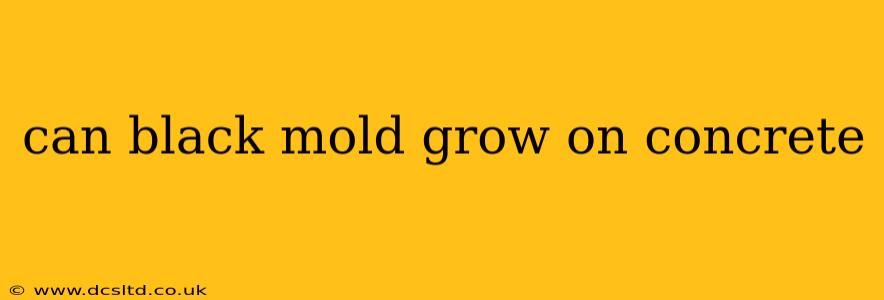Black mold, or Stachybotrys chartarum, is a type of fungus that thrives in damp, humid environments. While often associated with drywall and wood, many wonder: can black mold grow on concrete? The short answer is yes, but it's more complex than a simple yes or no. Concrete's porous nature and susceptibility to moisture make it a potential breeding ground, but several factors influence whether black mold will actually grow.
What Conditions Promote Black Mold Growth on Concrete?
Black mold needs specific conditions to flourish. Simply having concrete doesn't guarantee its presence. Key factors include:
-
Moisture: This is the most crucial element. Concrete exposed to consistent moisture, whether from leaks, flooding, high humidity, or poor drainage, creates an ideal environment for mold growth. Even seemingly minor leaks or persistent dampness can provide enough moisture for mold to take hold.
-
Organic Matter: Mold feeds on organic materials. While concrete itself is inorganic, dust, dirt, decaying plant matter, or even spilled food particles that accumulate on concrete surfaces can provide the necessary nutrients for mold growth.
-
Temperature: Moderate temperatures, typically between 68°F and 86°F (20°C and 30°C), are optimal for mold growth. Extremely hot or cold temperatures can inhibit its growth.
-
Poor Ventilation: Stagnant air with high humidity traps moisture and prevents evaporation, creating a breeding ground for mold. Good air circulation helps to dry out surfaces and discourage mold growth.
How Does Black Mold Penetrate Concrete?
Concrete isn't completely impervious to moisture. Its porous nature allows water to penetrate to some degree, depending on the type of concrete and its finish. The water then provides the moisture necessary for mold growth, often starting on the surface and potentially spreading deeper if the moisture persists.
What Are the Signs of Black Mold on Concrete?
Identifying black mold requires careful observation. Look for:
-
Discoloration: Black, green, or gray patches are common indicators. The mold may appear as fuzzy spots or a more widespread discoloration.
-
Musty Odor: A strong, musty odor is a telltale sign of mold growth, even before visible signs appear.
-
Respiratory Issues: If you suspect mold, and experience symptoms like coughing, sneezing, or wheezing, especially when near the concrete, it's crucial to seek professional evaluation.
Is Black Mold on Concrete Dangerous?
Exposure to black mold can trigger allergic reactions and respiratory problems in susceptible individuals. In severe cases, it can lead to more serious health issues. If you suspect black mold growth on concrete, it's vital to address the issue promptly.
How to Prevent Black Mold Growth on Concrete?
Prevention is key. Here are some steps to minimize the risk of black mold on concrete:
-
Maintain Dryness: Repair leaks promptly, improve drainage, and ensure proper ventilation. Regularly check for any signs of moisture.
-
Clean Regularly: Sweep or vacuum regularly to remove dust, dirt, and organic debris that can feed mold growth.
-
Use a Sealant: Applying a sealant to concrete surfaces can help reduce its porosity and prevent moisture penetration.
-
Use a Mold Inhibitor: Some specialized concrete sealants or coatings include mold inhibitors to further discourage growth.
How to Remove Black Mold from Concrete?
Removing black mold from concrete should be approached carefully. For small infestations, a solution of bleach and water can be effective (always follow safety precautions when using bleach). However, for larger infestations or if you suspect significant penetration, it's best to consult a professional mold remediation specialist. They have the expertise and equipment to safely and effectively remove the mold and prevent its recurrence.
Can I Test for Black Mold on Concrete Myself?
While DIY mold test kits are available, their accuracy can be limited. Professional mold testing offers more reliable results and can help determine the extent of the problem. Professional testing is particularly important in situations where health concerns are present.
This comprehensive guide provides insights into black mold's potential growth on concrete, emphasizing prevention, identification, and remediation strategies. Remember, addressing mold promptly is crucial for maintaining a healthy and safe environment.
